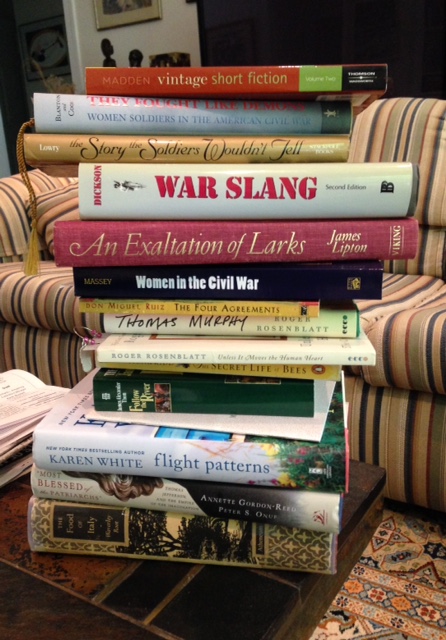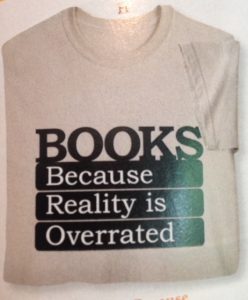Addict: a person who has a compulsion toward some activity. Because these compulsions are often injurious, the label of addict has negative connotations. So one might instead choose alternative labels, such as aficionado, buff, devotee, enthusiast, fan, fanatic, junkie, etc.
One who is addicted is dependent on something. Again, self-labeling might tend toward alternatives such as absorbed, devoted, fond, hooked, hyped, prone to, etc.
An addiction, being a habit of activity, is represented by many slang expressions, including bag, bent, craving, dependence, enslavement, fixation, hang-up, hook, inclination, jones, kick, monkey, obsession, shot, or thing. You’ll notice that these are largely negative, and seldom applied to book addicts.
But essentially, anything that is addictive is habit-forming, and that certainly applies to books.
Why addictions? Basically, an addiction is a coping mechanism. It is what a person turns to in time of stress, distress, boredom, anxiety, depression, etc. It takes one’s mind off whatever is unsatisfactory or unsettling. Many people will happily admit to “escapist” reading.
Not sure whether you’re a book addict or not?
Symptoms of book addiction:
- carrying a book (or e-reader) everywhere
- reading on subways, trains, planes, and when a passenger in a car
- reading in doctors’ waiting rooms or exam rooms, or when waiting for anything
- reading before the play or movie starts, and during intermissions
- reading during lunch or coffee breaks at work
- having stacks of unread books at home but still buying/borrowing more
- consistently preferring the book to the movie or TV series
- becoming anxious, uncomfortable, or irritable when no book is at hand

Dangers of book addiction:
- it can lead to further frustration when waiting for the next book by your favorite author(s)
- it often annoys family or friends
- limits exposure to other pop culture alternatives
- it can become costly, especially if you are at the book-a-day level of addiction.
As Erasmus once said, “When I get a little money, I buy books; and if any is left, I buy food and clothes.”
And, beware, this addiction is often passed on to one’s children and grandchildren, ad infinitum.
Advantages of book addiction:
Unlike other addictions, unless you actually try to read while driving or crossing a busy street, it isn’t likely to cause permanent or serious physical harm; and it has an educational component, exposing the addict to a broader vocabulary, exotic places, and the expansive possibilities of the human mind.
Of course, for a true addict, it leaves one open to a related psychological disorder.
Takeaway for book addicts:
Go for it! To paraphrase Abraham Lincoln, your best friend is a person who will give you a book you have not read. FYI, such persons are also known as “enablers.”

